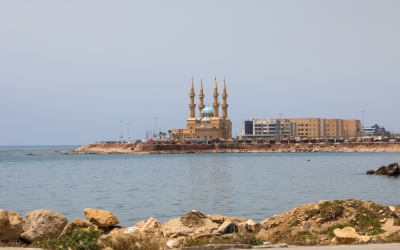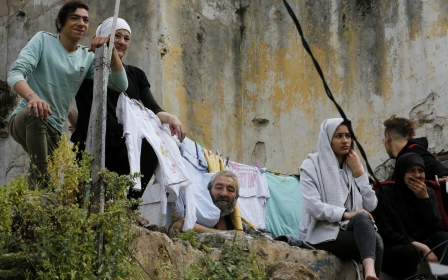'Mugged and robbed': Worried Lebanese turn to buying guns amid soaraway crime

“Come on you, put them in the bag,” a man in a surgical mask and holding a handgun said. “Are you stalling? Show me the cash till.”
This wasn’t a bank robbery in cash-strapped Lebanon, this was a man stealing nappies and some petty cash at a local pharmacy.
In another pharmacy, in the northern Beirut suburb of Jdeideh, a lanky man waving a handgun frantically scavenged through a cash till on Wednesday morning, demanding to take whatever cash he could find.
A soldier on patrol outside noticed the commotion, before making his way in and apprehending the 24-year-old.
Such street crimes appear to have escalated as a result of Lebanon's economic crisis, and increasingly worried residents are considering what they say was previously the unthinkable - buying a weapon.
Two residents, on condition of anonymity, shared their story with Middle East Eye about why they opted to purchase a firearm.
“In one month, I heard about multiple people being mugged and robbed,” Nidal* told MEE.
“Lawlessness has taken over. I felt I had to protect myself.”
Like many others in Lebanon, Nidal had withdrawn as much cash as possible from his bank account, as withdrawal limits for US dollars were implemented in late September 2019, causing nationwide panic.
But with his money now at home, and with Nidal living alone, he realised like many others that he could now be at risk.
Nidal’s firearm, which was bought for $500, is now worth over five times the country’s national minimum wage.
'I never thought I should own a gun'
At least 55 percent of Lebanon's population lives in poverty according to the United Nations, and confidence in an IMF-bailout has dwindled since lacklustre negotiations were put on hold in July.
Lebanon’s local currency has also lost roughly 80 percent of its value since protests against the government first began last October.
Adding to the downward spiral, a massive explosion at Beirut's port on 4 August left around 200 dead, more than 6,000 wounded and 300,000 homeless.
Hasan Diab, the then-prime minister, resigned less than a week later.
Amid the worsening economic situation and increasing crime, Nour*, like Nidal, feared for his personal safety.
“I thought about buying a weapon when the security situation started to fall apart,” he said.
“I shoot targets as a hobby – and I’m a really good shooter – but I never thought I should own a gun until now.”
Nour bought a Vzor 70, a weapon manufactured in the Czech Republic.
The price, he said, had skyrocketed. “The gun I have used to cost $300 before, and now it costs $700.”
Finding someone to sell him a handgun did not resemble a scene from a Hollywood movie - all it took was some word of mouth among relatives and other game hunters.
It was even more mundane for Nidal. “It was easy,” he told MEE. “I had [already] known someone who sells [guns].”
'Flourishing' weapons market
A recent report in the Kuwaiti newspaper Al Anba said the informal weapons market in Lebanon has been “flourishing”.
Prices have been hiked, and weapons dealers are only accepting payments in US dollars, paid in cash. But despite those two budget-breaking factors, demand is at a high.
A security source told MEE that there had been an increase in activity in the market.
“When there is a tense situation, there could be an increase in sales,” the source told MEE.
“The [economic] situation of course impacts the security situation.”
That being said, the source said the country’s security agencies have continued to apprehend criminals and have been able to keep things under control.
“These are things that we will continue to follow up with,” the source said.
Rekindled tensions
Meanwhile, Lebanon’s security agencies have far more on their hands than armed robberies amid the deteriorating situation.
Clashes between different political groups and communities have been renewed in several areas as the country’s economic crisis rekindled political tensions.
On 20 August, clashes took place in Khalde and Nabaa just outside Beirut, as well as in Saadnayel in the Bekaa Valley – all within less than 24 hours.
In Nabaa, a banner of Christian Lebanese Forces leader Samir Geagea was set fire to following the burning of a banner commemorating the Shia Muslim holiday Ashoura.
In Khalde, clashes between Hezbollah supporters and Sunni clans erupted after what appeared to be the hoisting of an Ashoura flag, leaving two dead.
Earlier this week, partisans from Lebanon’s two main Christian parties, the Lebanese Forces and Free Patriotic Movement, clashed outside the latter’s headquarters in Sin el-Fil.
All the acts of violence required intervention from the Lebanese Army or security forces.
'Freaked out'
On 8 September, the United States sanctioned former ministers from parties closely allied to Hezbollah, which appeared to have thrown a wrench into French President Emmanuel Macron’s efforts to help Prime Minister-designate Mustapha Adib form a new government.
With no end in sight for Lebanon’s economic and political crises, what did Nour and Nidal’s friends and family think of their decision to carry a firearm?
Nidal chose not to tell everyone.
“Only a few friends know, [but] they were surprised because they know I hate these things,” he said. “Then I explained my point of view, [and] they agreed with me.”
It was a slightly different response for Nour.
“There were all sorts of reactions - I had some friends who freaked out,” Nour told MEE, quietly laughing. “But I also had friends who were inspired to do the same.”
*Not their real name
This article is available in French on Middle East Eye French edition.
Middle East Eye delivers independent and unrivalled coverage and analysis of the Middle East, North Africa and beyond. To learn more about republishing this content and the associated fees, please fill out this form. More about MEE can be found here.






